How To Make Italian Ciabatta Bread Recipe With EVOO – A Delicious Labour of Love
Embrace the heart of Italian baking with your very own homemade ciabatta bread. Ciabatta, characterized by its rustic appearance and distinctively chewy texture, is a staple in Italian cuisine and a testament to the beauty of simplicity in baking.
Derived from the Italian word for “slipper,” due to its flat, elongated shape, ciabatta is richly aromatic and boasts a delightfully airy crumb encased in a crunchy, golden crust. This balance of textures makes it a versatile bread, perfect for sandwich making, dunking into soups, or savoring with a drizzle of quality olive oil.
In this recipe, I invite you to explore the art of traditional Italian bread making. The process, though time-consuming, is filled with small moments of joy and satisfaction – from the first mix of the ingredients, to the gradual transformation of the dough, and finally, the enticing scent of freshly baked bread filling your kitchen.
Make as much as you want and freeze to enjoy later.
What kind of flour should I use for ciabatta bread?
For the best ciabatta bread, I recommend using Flour 0, also known as Manitoba flour. This type of flour is a high-protein, strong bread flour that comes from hard wheat varieties. It’s perfect for ciabatta due to its high gluten content, which gives the bread its distinctively chewy texture and helps achieve that beautiful open crumb structure. Also, this flour’s high absorption rate is ideal for the relatively wet ciabatta dough, facilitating a slower, more stable rising process that contributes to the delicate flavor of the bread.
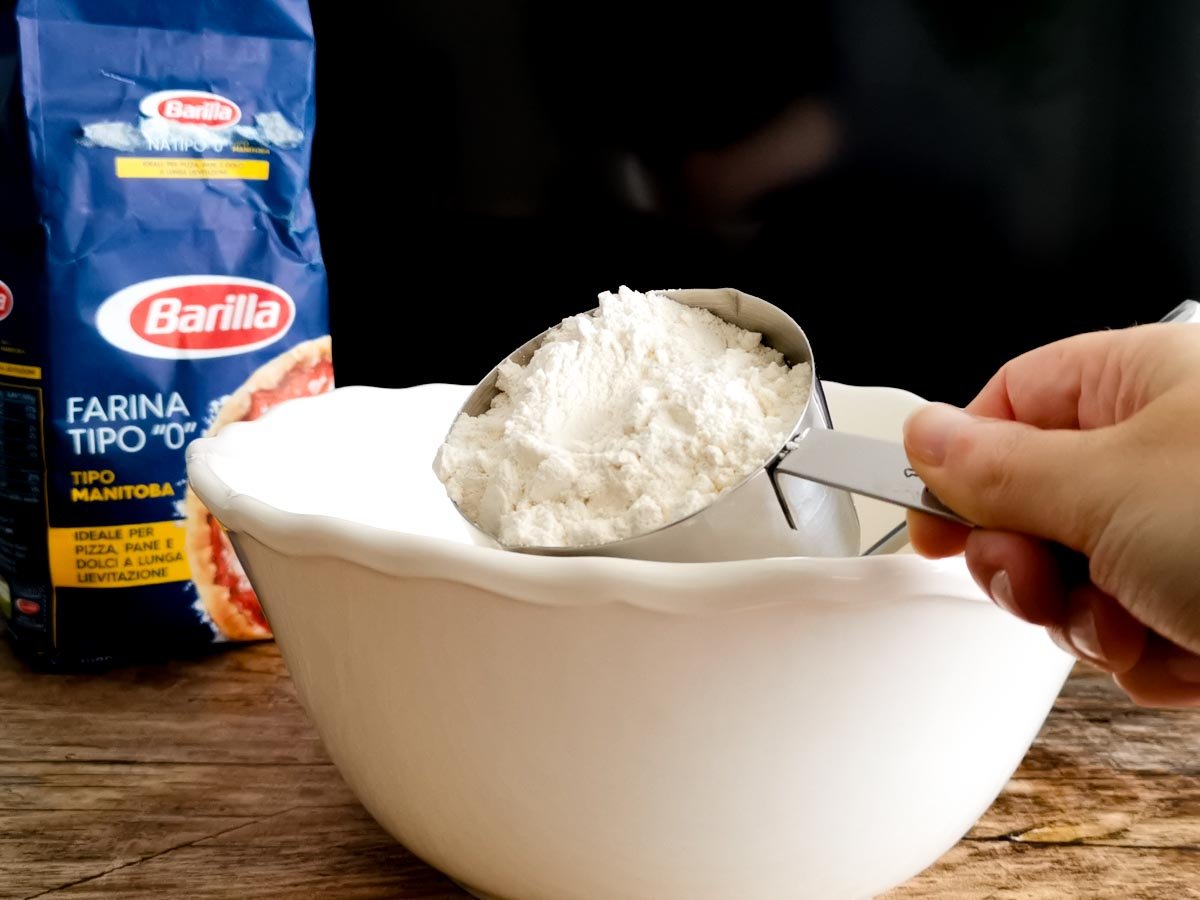
Can I make ciabatta bread without a stand mixer?
Absolutely, you can definitely make ciabatta bread without a stand mixer. Bread making is a centuries-old tradition, and Italian bakers have been perfecting their bread long before the invention of stand mixers. Using your hands to mix and knead the dough can connect you more intimately with the bread-making process, allowing you to feel the changes in the dough’s consistency and better understand its transformation. It might require more effort, but the resulting sense of accomplishment makes it worth it. In this recipe, we are doing just that!
How do I know when the dough has risen enough?
The dough should typically double or even triple in size, but it’s crucial not to get too hung up on that. Bread dough can be somewhat unpredictable, and various factors like room temperature, yeast activity, and dough consistency can affect the rising process. Sometimes, the dough might get larger but still not achieve the ideal consistency. That’s OK! Your bread will still be delicious, and remember, this might be your first try. The key is to learn from the process and adjust as you go along.
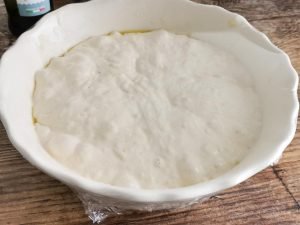
How can I get a perfect crispy crust?
To achieve a perfect crispy crust on your ciabatta, you can use a couple of techniques. Sprinkle some flour on top of the dough before baking to help achieve a rustic, artisan look. Brushing the dough with olive oil before baking will not only give it a beautiful golden color but also contribute to a crispier crust. Positioning the bread on a higher level of the oven can also help as it exposes the bread to more direct heat. Lastly, placing the bread under the grill for about 2 minutes towards the end of baking can give the crust that final delightful crunch.
Why is my ciabatta bread too dense?
If your ciabatta bread turned out denser than expected, a neat trick to salvage it is to freeze and then thaw it. The process of freezing and unfreezing can sort of rehydrate the bread, making it softer and more enjoyable to eat. Remember that bread making is an art, and each attempt brings you one step closer to your ideal loaf of ciabatta.
How do I store ciabatta bread, and how long does it stay fresh?
Ciabatta bread can be stored like your other breads, typically in a bread box or airtight container at room temperature. However, like all fresh bread, ciabatta is best enjoyed within a day or two of baking. If you’ve made a large batch, consider freezing some of it to preserve its freshness. Just make sure to wrap it securely to prevent freezer burn. When you’re ready to enjoy the bread, simply thaw it at room temperature. The freezing process shouldn’t impact the texture or taste significantly, and you’ll be able to enjoy fresh-tasting ciabatta whenever you want.
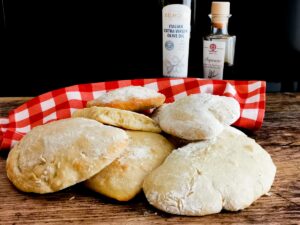
Can I add other ingredients to my ciabatta, like olives or herbs?
Certainly, the beauty of bread-making lies in its adaptability. However, if this is your first attempt at making ciabatta, I would suggest keeping it plain. This will allow you to master the basic process and understand the fundamental characteristics of ciabatta bread. Once you’re comfortable with the basic recipe, feel free to begin experimenting with additions like olives, herbs, or even cheese to put your unique spin on it.
Can I freeze the dough or the baked ciabatta bread?
Freezing baked ciabatta bread is a great way to maintain its freshness, especially if you’ve baked a large batch. The process is simple and doesn’t significantly impact the texture or flavor of the bread. As for freezing unbaked ciabatta dough, it’s less commonly done and the results may vary. If you decide to go ahead and try it, we’d love to hear about your experience and the results.
What should I do to get the perfect open crumb structure?
Baking bread, especially one like ciabatta with its trademark open crumb structure, can sometimes seem intimidating in the quest for perfection. But remember, while we all admire those professional bakery-style loaves, homemade bread doesn’t need to look perfect to be delicious. What matters is that it’s not dry and tastes good. Over time, as you become more familiar with the process and how the dough should feel at each stage, your technique will improve and so will your bread. Enjoy the journey, appreciate each step, and take pride in your homemade ciabatta bread.
What can I serve with ciabatta bread?
Ciabatta bread is wonderfully versatile. It’s perfect for dipping into a mix of quality olive oil and balsamic vinegar, letting its open crumb absorb these simple yet flavorful liquids. Create your favorite sandwich with it, allowing the sturdy yet airy bread to hold everything together. Use it to practice the ‘scarpetta,’ an Italian tradition of using bread to mop up any remaining sauce from your meal. It’s also fantastic partnering with hearty soups and stews, and for a delightful breakfast treat, try it toasted with butter and jam or slathered with Nutella. With ciabatta bread, the possibilities are deliciously endless.

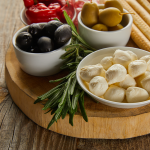


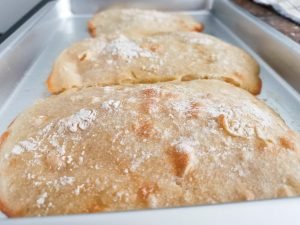
Easy Ciabatta Bread Recipe
While this recipe is not a short one, it’s very easy to follow and re-create. So print the recipe card below, or get it ready on your mobile & let’s make some tasty ciabatta bread.
Make sure you have some delicious oil and balsamic combo to use for dipping your bread once it’s out of the oven. It’s the simplest most divine way to eat it. We suggest Belmorso EVOO & either Saporoso Balsamic or our new Belmorso IGP.
